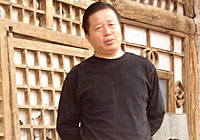




HONG KONG—Authorities across China have stepped up detentions and surveillance of key rights activists amid growing calls for the release of Beijing-based lawyer Gao Zhisheng.
"Gao Zhisheng was taken away by unidentified men in plain clothes who gave no identification nor any reason for his detention while he was on a trip to Dongying city, Shandong province, to visit his sister," said New York-based writer Hu Ping of Gao’s August 15 arrest.
"Gao Zhisheng is a well-known lawyer who has been on the front line in the battle for civil rights for a very long time," wrote Hu, an occasional RFA commentator, in an open online letter.
"He has been subject to all manner of persecution...and we strongly protest against this and call for his immediate release."
The police have committed a crime. It is forbidden for police to enter someone's home without going through the correct procedures. This is very clearly set down in the criminal code,
Hu said that Gao's sister's household was put under immediate surveillance and communications cut off.
Gao's detention by the Beijing municipal public security bureau "for suspected involvement in criminal activities" was reported by Xinhua, suggesting top-level involvement in the decision to detain him.
Elsewhere, academics and activists led by Ai Xiaoming, a professor of Chinese at Zhongshan University in the southern province of Guangdong, wrote a letter attacking the authorities' actions.
The letter said that policemen had illegally entered Gao's home and detained his wife and children, violating the Chinese constitution and the United Nations Convention on the Rights of the Child. The letter called for an end to all illegal restrictions on Gao’s wife and children. It also urged bringing to account all those involved in the operation, including supervisors.
Calls to Ai's telephone number went unanswered Wednesday.
Du Daobin, a dissident based in the central province of Hubei, signed the letter. He told RFA's Mandarin service: "The police have committed a crime. It is forbidden for police to enter someone's home without going through the correct procedures. This is very clearly set down in the criminal code."
Retired former Shandong University professor Sun Wenguang said he was also under surveillance following a series of telephone calls that he made to Gao's house when he became concerned about the lawyer's safety.
"If you want to do something to help, you can sign the two petitions and open letters which are circulating on the Internet right now," Sun said.
Meanwhile, two volunteer activists who had worked with Gao, and who traveled to Yinan in the eastern province of Shandong to attend the trial of blind rights activist Chen Guangcheng, were detained in the northern city of Xian.
Rights activist Deng Yongliang, together with lawyer Zhang Jiankang, were detained at the Jiaotong Hotel in Yinan by police, Zhang told RFA's Cantonese service from his hotel room Friday. Neither man was reachable by cellphone Wednesday.
Deng's wife Zhu Yuling said she had made enquiries about her husband's whereabouts via friends but got nowhere. She then went to the state security police office in Xian and was turned away, but with some confirmation of his detention.
"They told me he is fine, being taken care of, with food and drink, and that I should go home and not worry, and not come back again," she told Cantonese reporter Grace Kei Lai-see.
China’s official Xinhua news agency once described Gao Zhisheng, 42, as "one of China's top ten lawyers," who has "long been an expert in the legal aid field."
Gao lost his law license after he criticized the government for its treatment of the banned Falun Gong spiritual movement.
He also began a rolling hunger strike earlier in the year to protest the ill-treatment of lawyers and rights activists at the hands of police and local government officials.
The protest began in reaction to the beating of top Guangdong rights lawyer Guo Feixiong. Guo was a close associate of Gao, and both lawyers had worked on a number of sensitive cases, including the Taishi village standoff in the southern province of Guangdong last year.
Original reporting in Mandarin by Yan Ming and in Cantonese by Grace Kei Lai-see. Mandarin service director: Jennifer Chou. Cantonese service director: Shiny Li. Translated and written for the Web in English by Luisetta Mudie. Edited by Sarah Jackson-Han.